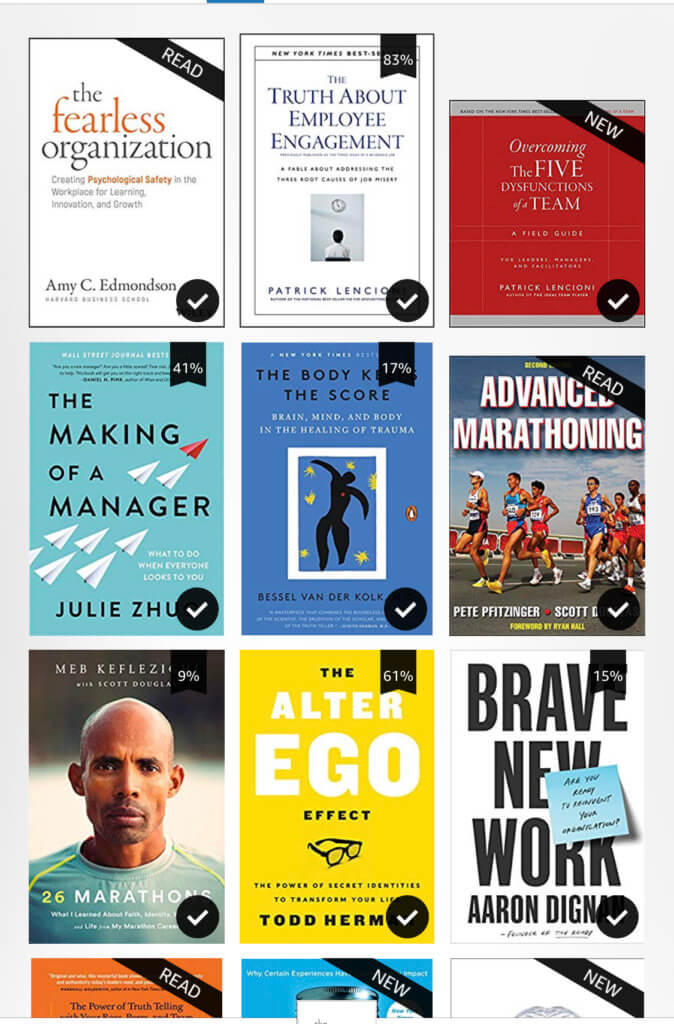Be a Great Storyteller

A wise person once told me, “If you are a great story teller, they will follow you into the fire 🔥 and thank you for the burns.
So live a great life so you have a great story worth following.”

A wise person once told me, “If you are a great story teller, they will follow you into the fire 🔥 and thank you for the burns.
So live a great life so you have a great story worth following.”

Don’t expect to get everything you need from a single relationship or person, either socially, personally or in your career.
Find people who give you a part of what you need and find the rest in other people.
No one can provide everything.
Plus, it’s not fair to put pressure on anyone to do that.
Stitch together the quilt of relationships that you need!

Here are the latest business, culture change, HR, and leadership books I’m reading. Most of these are really good! Recommend checking them out.
Have you read any of them? What’s on your list?

Salespeople Are The Unsung Heroes of the Economy. They are the grease that keeps the wheels spinning. Human resources professionals are the heart and soul of an organization (i.e. the people!!).
(podcast is here, youtube here)
I mean, who else could sell ice to the Eskimos? Get a bunch of people from different backgrounds and worlds to effectively come together and work as a team?
But with the pressures they face and the breakneck schedules they work with day-in-day-out, how do they take the time to slow down and find meaning in their endeavors?
Jason Treu tells his own story in this video.
Jason Treu (Troy) is a coach who works with executives, entrepreneurs and rising stars to maximize their leadership potential and performance. He also helps them build and execute their career blueprint. He’s the best-selling author of Social Wealth, a how-to-guide on building extraordinary business relationships, which has sold more than 60,000 copies. He hosts the podcast show, Executive Breakthroughs, bringing game-changing CEOs, entrepreneurs, and experts that share their breakthroughs and breakdowns. Jason talks about being self-aware and how important this is to be successful. He talks and provides examples of people who ruined it for themselves by not being able to adjust and work on themselves. Jason gives advice on how to overcome your flaws and be better at life. This is a great Podcast to get some life coaching in and get an insight into Jason and Stefan’s look on life.
0:00 – Ex: “A really good quote” or A very interesting topic
1:25 – “how did you get started in what you do?”
2:25 – Jason created a company to help people socialize
4:00 – “how does a guy have a good social life these days?”
6:45 – self-awareness is the most underrated quality
9:00 – no one is being accountable these days for personal actions
10:00 – as a kid you learn to deal with things a certain way which become worse as you get older but subconsciously you do it
17:50 – Stefan talks about his date where she accused him of not being from the high school he said
19:45 – “imposter syndrome” Jason explains what this is
22:15 – Stefan talks about how people, as you get more successful cant, relate to each other
23:40 – “when do you think a person goes from illegitimate to legitimate
26:05 – people don’t like to sell cause they have to face rejection
27:30 – Stefan asks Jason about his book
Facebook – https://www.facebook.com/JasonTreuExecutiveCoaching/
Twitter – https://twitter.com/jasontreu
Website – https://jasontreu.com/
Instagram – https://www.instagram.com/jasontreu/
Youtube – https://www.youtube.com/c/jasontreu
LinkedIn – https://www.linkedin.com/in/jasontreu
“If you want to escape from prison, what is the first thing you need to know?”
One student said you need to find the key. One said to get a great attorney (like OJ). One said to convince someone to let them out.
The teacher rolled their eyes, smiled and said no each time. Then the teacher responded after everyone said something.
“The first you need to know if you want to escape from prison is that you are in prison.”
Self-awareness, understanding and acceptance are on where you are at and why is essential BEFORE you can take highly effective massive action.
Otherwise you solve for the leaf on the tree and not the root cause. It’s one of the biggest mistakes leaders and managers make.
It’s the first step I share with human resource professionals and other managers on how to build great teams and teamwork.
Understanding your team can be doing better, why that is and what role you have played in it…is step one.
It’s not problem solving because it will happen again otherwise.
History repeats itself until you learn the entire lesson.
The ONLY one keeping YOU from your dreams…
is YOURSELF.
We all need to be reminded of simple things that we know, but forget or create false narratives to make us the victims in our own lives.
Don’t let self-imposed limitations stop you.
Don’t let others define you.
Don’t let the journey derail you.
Don’t let would of, could of or should of be your story.
Go get it. Be resourceful.
So what’s your dream? What’s REALLY stopping you?